初中英语外研版七年级下册Module 8 Story time Unit 2 Goldilocks hurried out of the house. 练习 (含解析)
文档属性
| 名称 | 初中英语外研版七年级下册Module 8 Story time Unit 2 Goldilocks hurried out of the house. 练习 (含解析) |
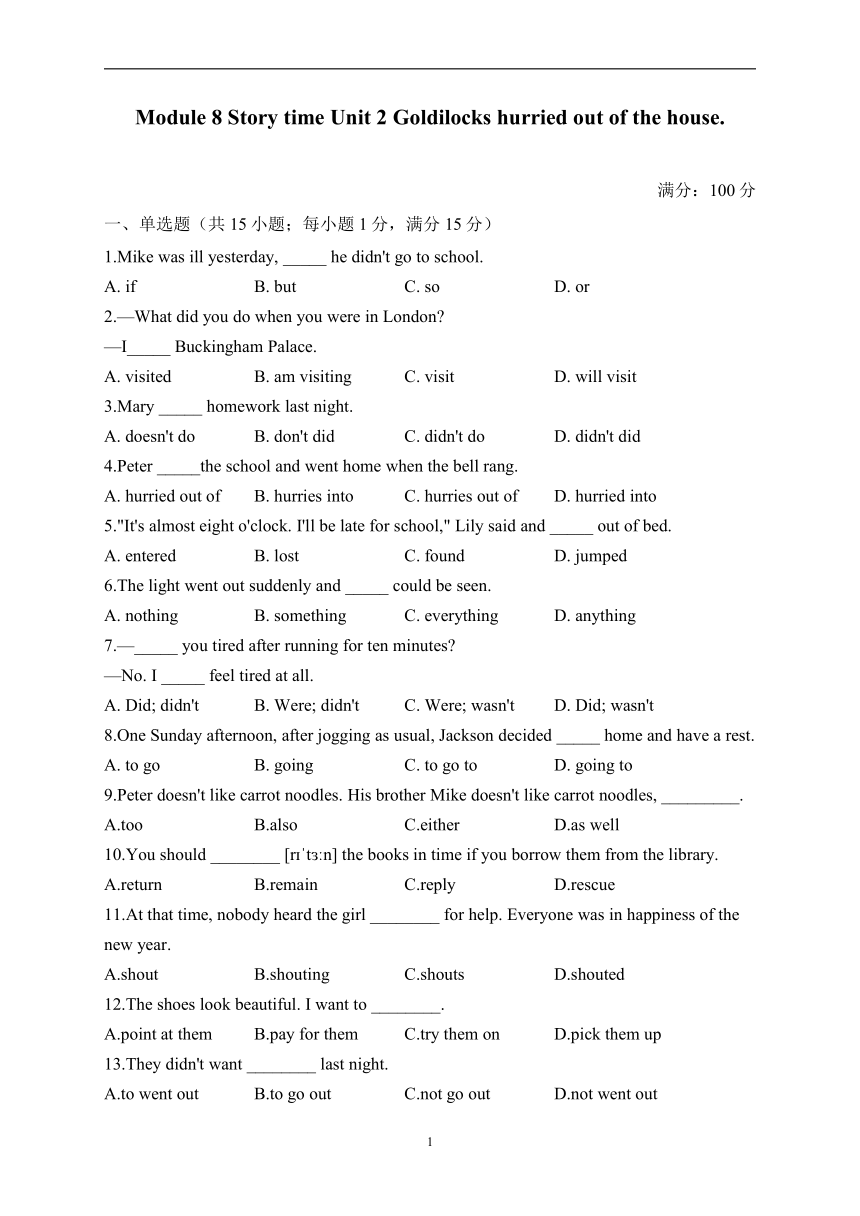
|
|
| 格式 | docx | ||
| 文件大小 | 281.3KB | ||
| 资源类型 | 教案 | ||
| 版本资源 | 外研版 | ||
| 科目 | 英语 | ||
| 更新时间 | 2023-09-13 13:43:33 | ||
图片预览

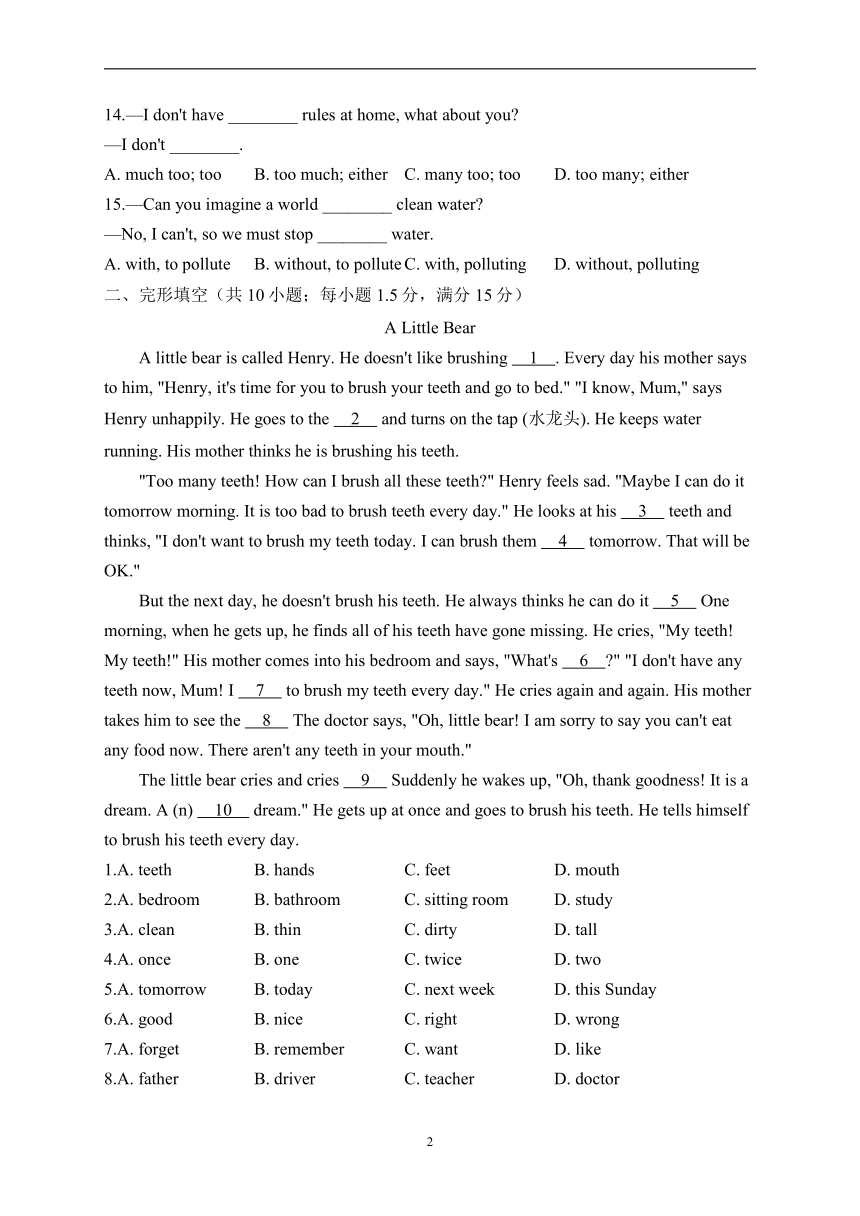
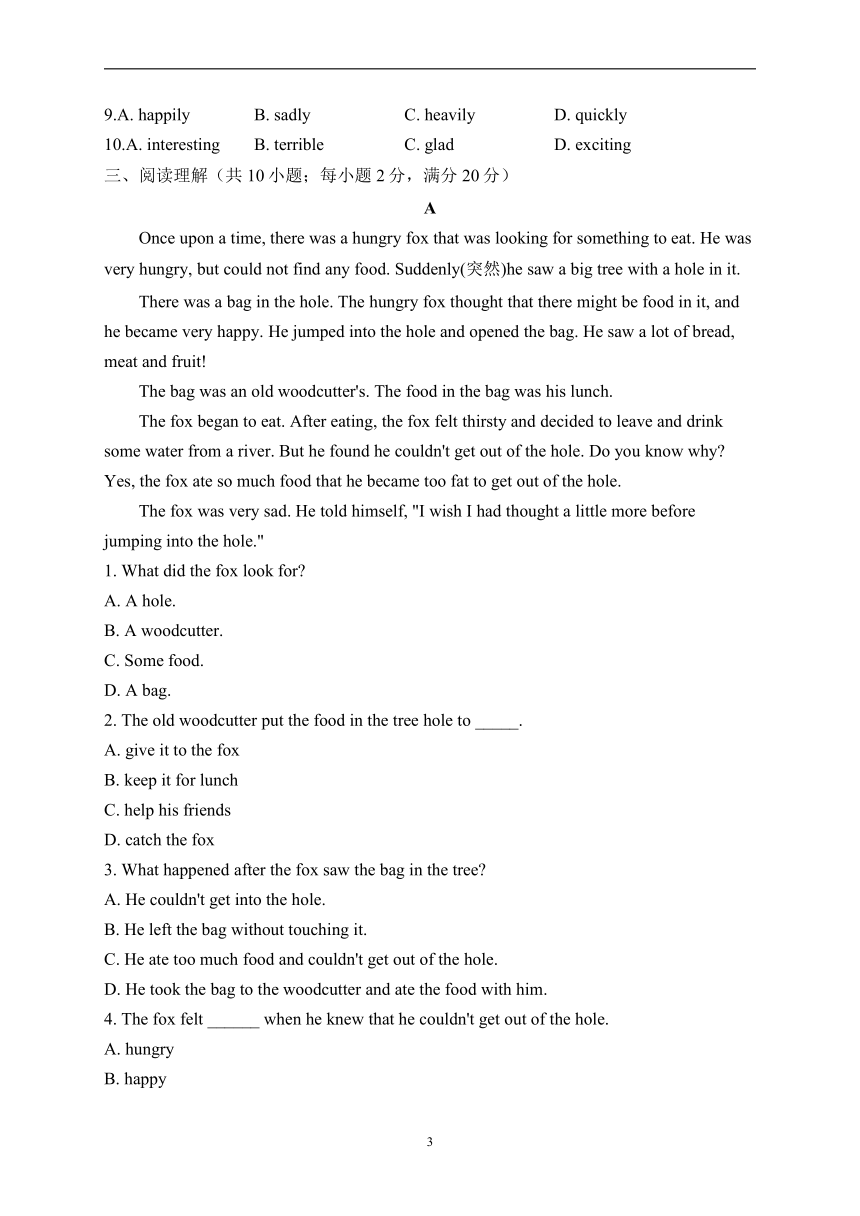
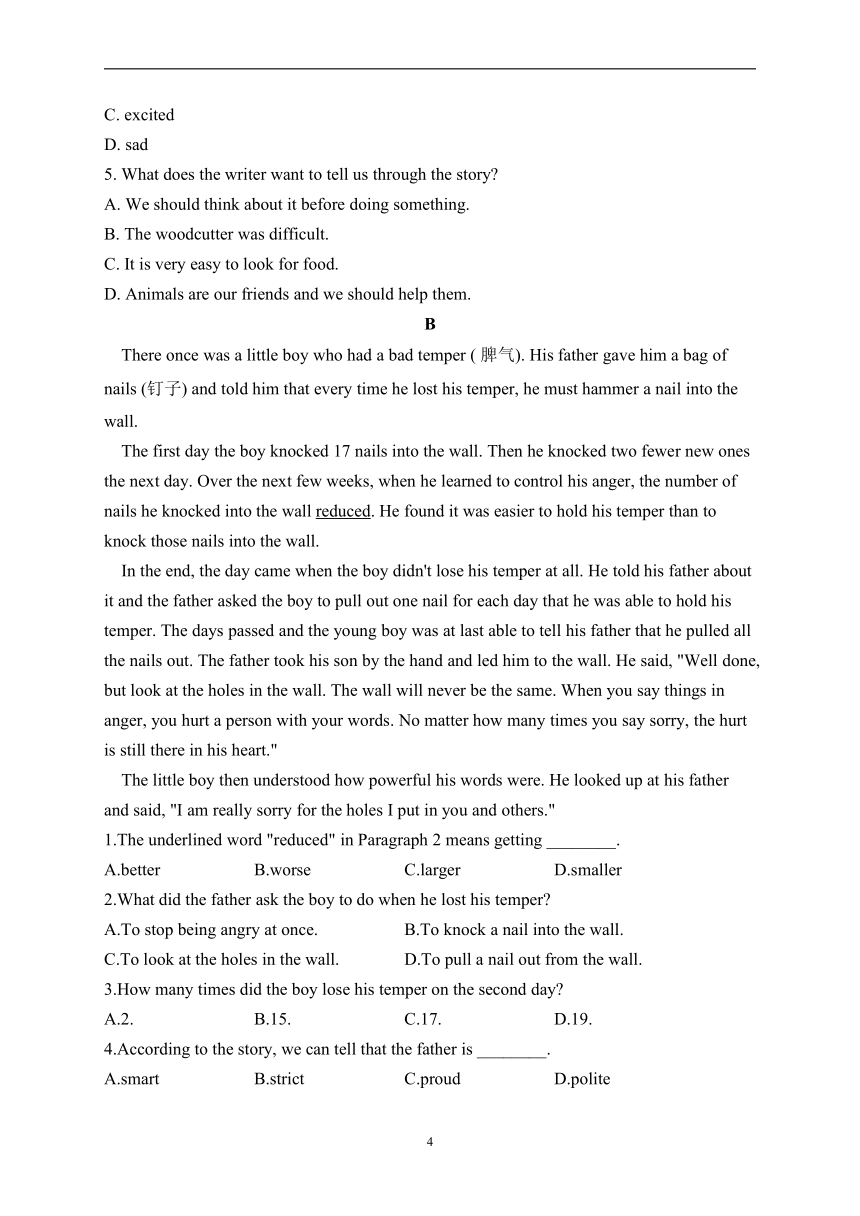
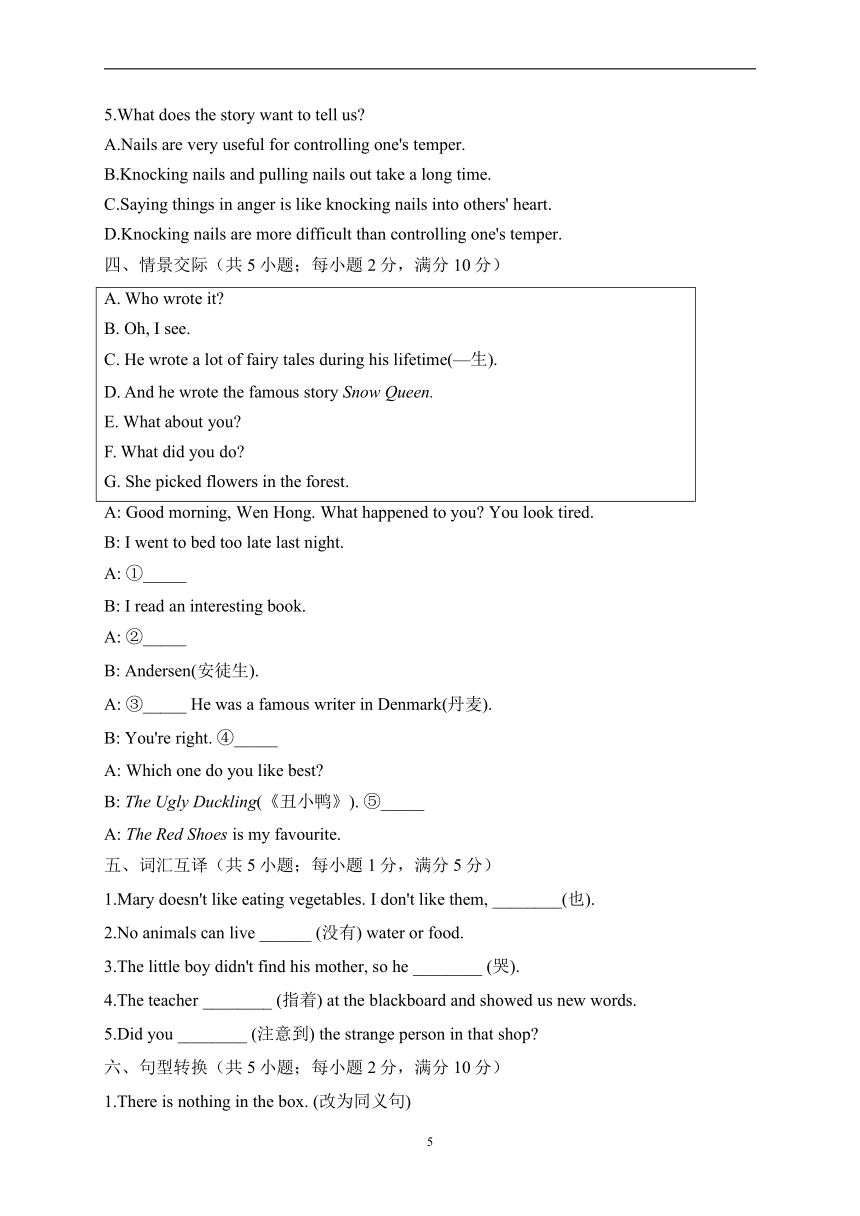
文档简介
Module 8 Story time Unit 2 Goldilocks hurried out of the house.
满分:100分
一、单选题(共15小题;每小题1分,满分15分)
1.Mike was ill yesterday, _____ he didn't go to school.
A. if B. but C. so D. or
2.—What did you do when you were in London
—I_____ Buckingham Palace.
A. visited B. am visiting C. visit D. will visit
3.Mary _____ homework last night.
A. doesn't do B. don't did C. didn't do D. didn't did
4.Peter _____the school and went home when the bell rang.
A. hurried out of B. hurries into C. hurries out of D. hurried into
5."It's almost eight o'clock. I'll be late for school," Lily said and _____ out of bed.
A. entered B. lost C. found D. jumped
6.The light went out suddenly and _____ could be seen.
A. nothing B. something C. everything D. anything
7.—_____ you tired after running for ten minutes
—No. I _____ feel tired at all.
A. Did; didn't B. Were; didn't C. Were; wasn't D. Did; wasn't
8.One Sunday afternoon, after jogging as usual, Jackson decided _____ home and have a rest.
A. to go B. going C. to go to D. going to
9.Peter doesn't like carrot noodles. His brother Mike doesn't like carrot noodles, _________.
A.too B.also C.either D.as well
10.You should ________ [r t n] the books in time if you borrow them from the library.
A.return B.remain C.reply D.rescue
11.At that time, nobody heard the girl ________ for help. Everyone was in happiness of the new year.
A.shout B.shouting C.shouts D.shouted
12.The shoes look beautiful. I want to ________.
A.point at them B.pay for them C.try them on D.pick them up
13.They didn't want ________ last night.
A.to went out B.to go out C.not go out D.not went out
14.—I don't have ________ rules at home, what about you
—I don't ________.
A. much too; too B. too much; either C. many too; too D. too many; either
15.—Can you imagine a world ________ clean water
—No, I can't, so we must stop ________ water.
A. with, to pollute B. without, to pollute C. with, polluting D. without, polluting
二、完形填空(共10小题;每小题1.5分,满分15分)
A Little Bear
A little bear is called Henry. He doesn't like brushing 1 . Every day his mother says to him, "Henry, it's time for you to brush your teeth and go to bed." "I know, Mum," says Henry unhappily. He goes to the 2 and turns on the tap (水龙头). He keeps water running. His mother thinks he is brushing his teeth.
"Too many teeth! How can I brush all these teeth " Henry feels sad. "Maybe I can do it tomorrow morning. It is too bad to brush teeth every day." He looks at his 3 teeth and thinks, "I don't want to brush my teeth today. I can brush them 4 tomorrow. That will be OK."
But the next day, he doesn't brush his teeth. He always thinks he can do it 5 One morning, when he gets up, he finds all of his teeth have gone missing. He cries, "My teeth! My teeth!" His mother comes into his bedroom and says, "What's 6 " "I don't have any teeth now, Mum! I 7 to brush my teeth every day." He cries again and again. His mother takes him to see the 8 The doctor says, "Oh, little bear! I am sorry to say you can't eat any food now. There aren't any teeth in your mouth."
The little bear cries and cries 9 Suddenly he wakes up, "Oh, thank goodness! It is a dream. A (n) 10 dream." He gets up at once and goes to brush his teeth. He tells himself to brush his teeth every day.
1.A. teeth B. hands C. feet D. mouth
2.A. bedroom B. bathroom C. sitting room D. study
3.A. clean B. thin C. dirty D. tall
4.A. once B. one C. twice D. two
5.A. tomorrow B. today C. next week D. this Sunday
6.A. good B. nice C. right D. wrong
7.A. forget B. remember C. want D. like
8.A. father B. driver C. teacher D. doctor
9.A. happily B. sadly C. heavily D. quickly
10.A. interesting B. terrible C. glad D. exciting
三、阅读理解(共10小题;每小题2分,满分20分)
A
Once upon a time, there was a hungry fox that was looking for something to eat. He was very hungry, but could not find any food. Suddenly(突然)he saw a big tree with a hole in it.
There was a bag in the hole. The hungry fox thought that there might be food in it, and he became very happy. He jumped into the hole and opened the bag. He saw a lot of bread, meat and fruit!
The bag was an old woodcutter's. The food in the bag was his lunch.
The fox began to eat. After eating, the fox felt thirsty and decided to leave and drink some water from a river. But he found he couldn't get out of the hole. Do you know why Yes, the fox ate so much food that he became too fat to get out of the hole.
The fox was very sad. He told himself, "I wish I had thought a little more before jumping into the hole."
1. What did the fox look for
A. A hole.
B. A woodcutter.
C. Some food.
D. A bag.
2. The old woodcutter put the food in the tree hole to _____.
A. give it to the fox
B. keep it for lunch
C. help his friends
D. catch the fox
3. What happened after the fox saw the bag in the tree
A. He couldn't get into the hole.
B. He left the bag without touching it.
C. He ate too much food and couldn't get out of the hole.
D. He took the bag to the woodcutter and ate the food with him.
4. The fox felt ______ when he knew that he couldn't get out of the hole.
A. hungry
B. happy
C. excited
D. sad
5. What does the writer want to tell us through the story
A. We should think about it before doing something.
B. The woodcutter was difficult.
C. It is very easy to look for food.
D. Animals are our friends and we should help them.
B
There once was a little boy who had a bad temper ( 脾气). His father gave him a bag of nails (钉子) and told him that every time he lost his temper, he must hammer a nail into the wall.
The first day the boy knocked 17 nails into the wall. Then he knocked two fewer new ones the next day. Over the next few weeks, when he learned to control his anger, the number of nails he knocked into the wall reduced. He found it was easier to hold his temper than to knock those nails into the wall.
In the end, the day came when the boy didn't lose his temper at all. He told his father about it and the father asked the boy to pull out one nail for each day that he was able to hold his temper. The days passed and the young boy was at last able to tell his father that he pulled all the nails out. The father took his son by the hand and led him to the wall. He said, "Well done, but look at the holes in the wall. The wall will never be the same. When you say things in anger, you hurt a person with your words. No matter how many times you say sorry, the hurt is still there in his heart."
The little boy then understood how powerful his words were. He looked up at his father and said, "I am really sorry for the holes I put in you and others."
1.The underlined word "reduced" in Paragraph 2 means getting ________.
A.better B.worse C.larger D.smaller
2.What did the father ask the boy to do when he lost his temper
A.To stop being angry at once. B.To knock a nail into the wall.
C.To look at the holes in the wall. D.To pull a nail out from the wall.
3.How many times did the boy lose his temper on the second day
A.2. B.15. C.17. D.19.
4.According to the story, we can tell that the father is ________.
A.smart B.strict C.proud D.polite
5.What does the story want to tell us
A.Nails are very useful for controlling one's temper.
B.Knocking nails and pulling nails out take a long time.
C.Saying things in anger is like knocking nails into others' heart.
D.Knocking nails are more difficult than controlling one's temper.
四、情景交际(共5小题;每小题2分,满分10分)
A. Who wrote it B. Oh, I see. C. He wrote a lot of fairy tales during his lifetime(—生). D. And he wrote the famous story Snow Queen. E. What about you F. What did you do G. She picked flowers in the forest.
A: Good morning, Wen Hong. What happened to you You look tired.
B: I went to bed too late last night.
A: ①_____
B: I read an interesting book.
A: ②_____
B: Andersen(安徒生).
A: ③_____ He was a famous writer in Denmark(丹麦).
B: You're right. ④_____
A: Which one do you like best
B: The Ugly Duckling(《丑小鸭》). ⑤_____
A: The Red Shoes is my favourite.
五、词汇互译(共5小题;每小题1分,满分5分)
1.Mary doesn't like eating vegetables. I don't like them, ________(也).
2.No animals can live ______ (没有) water or food.
3.The little boy didn't find his mother, so he ________ (哭).
4.The teacher ________ (指着) at the blackboard and showed us new words.
5.Did you ________ (注意到) the strange person in that shop
六、句型转换(共5小题;每小题2分,满分10分)
1.There is nothing in the box. (改为同义句)
There is ______ ________ in the box.
2.He had some water. (改为一般疑问句)
_________ he ________ ______ water
3.I went to school, but I didn't have breakfast. (用without改写句子)
I went to school _________ _________ breakfast.
4.He had a little rice. Then he hurried to the factory. (合并为一句)
He had a little rice _______ _______ ________ the factory.
5.The girl decided to be a doctor at the age of 12. (对画线部分提问)
______ _______ the girl ________ to ________ at the age of 12
七、书面表达(共1小题;满分25分)
请根据表格内容,写一则小故事。要求:60词左右;语言表达准确,语义连贯,可适当发挥。
提示:
主人公 汤姆和他的狗
故事梗概 一天,汤姆去公园发现了一只小狗,它受伤 (get hurt)了,汤姆把它带回家悉心照料,小狗变强壮了。它帮助汤姆看家,拿报纸,并且可以照顾他的小孩。
____________________________________________________________________________________________________________________________________________________________________________________________________________________________________________________________________________________________________________
答案以及解析
一、单选题
1.答案:C
解析:句意为:昨天迈克生病了,所以他没去上学。 设空前后内容之间为因果关系,且结果在后,应用so。故选C。
2.答案:A
解析:根据"What did you do when you were in London " 可知答语应用一般过去时。故选A。
3.答案:C
解析:根据last night可知应用一般过去时;didn't后用动词原形。结合选。故选C。
4.答案:A
解析:句意为:当铃响的时候,彼得匆忙地从学校出来回家了。hurry out of意为"自……匆忙而出";hurry into意为"匆忙进入"。结合语境可排除B 项和D项;根据went home可知,本句用一般过去时。故选A。
5.答案:D
解析:enter意为"进入";lose意为"丢失";find意为 "找到";jump 意为"跳"。根据I'll be late for school可知,此处表示从床上跳下来。故选D。
6.答案:A
解析:句意为:灯突然灭了,什么也看不到。nothing 意为"没有任何东西";something意为"某事;某物",常用于肯定句中;everything意为"每件事物" ;anything意为"任何事物",常用于否定句或疑问句中。故选A。
7.答案:B
解析:tired是形容词,在句中作表语,其前要加be 动词;feel是实义动词,构成否定形式时,应用助动词。故选B。
8.答案:A
解析:decide to do sth 意为"决定做某事";go home 意为"回家",为固定搭配。故选A。
9.答案:C
解析:句意:彼得不喜欢胡萝卜面条。他的弟弟迈克也不喜欢胡萝卜面条。考查副词辨析。too也,一般用于肯定句句末;also也,一般用于肯定句句中;either也,一般用于否定句句末;as well也,一般用于肯定句句末。根据"His brother Mike doesn't like carrot noodles"可知这是一个否定句,用either表示"也"。故选C。
10.答案:A
解析:句意:如果你从图书馆借书,你应该及时归还。考查动词辨析和单词的读音。return [r t n]"归回,返回";remain [r me n]"保持,仍然是";reply [r pla ]"答复,回答";rescue [ reskju ]"援救,抢救"。结合单词的读音及"if you borrow them from the library"可知,return [r t n]"归回,返回"符合语境。故选A。
11.答案:B
解析:句意:那个时候,没有人听到女孩的呼救声,大家都沉浸在新年的快乐中。考查非谓语动词。hear sb. do sth."听见某人做了某事"(强调经常性或全过程);hear sb. doing sth."听见某人正在做某事"(强调动作正在进行)。根据"At that time…"可知,要用hear sb. doing sth.,强调动作正发生;shout的分词形式shouting。故选B。
12.答案:C
解析:句意:这双鞋看起来很漂亮。我想试穿下它们。考查动词短语辨析。point at them指向它们;pay for them支付它们;try them on试穿它们;pick them up捡起它们。根据"The shoes look beautiful"可知,鞋很漂亮,想试穿一下符合语境。故选C。
13.答案:B
解析:句意:他们昨晚不想出去。考查非谓语动词。go out出去,过去式是went out。want to do sth表示"想要做某事",固定短语。故选B。
14.答案:D
解析:句意:——我在家没有太多的规矩,你呢?——我也没有。考查短语辨析和副词辨析。much too太……,后接形容词或副词;too much太多,后接不可数名词;too many太多,后接可数名词复数;没有many too这种用法。根据"rules"是可数名词复数,故要用too many来修饰。too也,用在肯定句末;either也,用在否定句末。根据"I don't"可知是否定句,故要用either。故选D。
15.答案:D
解析:句意:——你能想象一个没有干净水的世界吗?——不,我不能,所以我们必须要停止污染水。考查介词以及非谓语动词。with带有;without没有。根据"Can you imagine a world … clean water"以及"so we must stop …water"可知,此处询问是否可以想象没有干净水的世界,故第一空填without。stop to do sth停下来去做某事;stop doing sth停止正在做的事情。第二空指停止正在污染这件事。故选D。
二、完形填空
答案:1-5ABCCA 6-10DADBB
解析:1.根据下文中的brush your teeth可知,此处表示他不喜欢刷牙。故选A。
2.根据下文中的turns on the tap可知亨利去了浴室。bedroom意为"卧室";bathroom意为"浴室"; sitting room意为"客厅";study意为"书房"。故选 B。
3.根据上文内容可知,因为他没有刷牙,所以牙齿应该是脏的。clean意为"干净的";thin意为"瘦的"; dirty意为"脏的"; tall意为"高的"。故选C。
4.句意为:我可以明天刷两次牙。根据"I don't want to brush my teeth today."和下文可知,twice 意为"两次",符合语境。故选C。
5.根据上文内容可知,亨利总是把刷牙的事情留到明天。tomorrow意为"明天"。故选A。
6.句意为:他的妈妈进入他的卧室说:"怎么了 " "What's wrong "意为"怎么了 "故选D。
7.句意为:我每天都忘记刷牙。forget意为"忘记";remember意为"记得";want意为"想要";like 意为"喜欢"。根据上文可知选A。
8.句意为:他的妈妈带他去看医生。根据The doctor says 可知此处为doctor ; see the doctor 意为 "看医生",为固定用法。故选D。
9.根据上文可知医生告诉小熊不能吃任何东西, 所以他伤心地哭了。sadly意为"伤心地",符合语境。故选B。
10.根据上文内容可知,对于小熊来说这是一个可怕的梦。terrible意为"可怕的"。故选B。
三、阅读理解
A
答案:1-5CBCDA
解析:1.细节理解题。根据第一段中的there was a hungry fox that was looking for something to eat 可知,这只狐狸在寻找食物。故选C。
2.细节理解题。根据第三段"The bag was an old woodcutter's. The food in the bag was his lunch. "可知, 袋子里的食物是伐木工的午餐。故选B。
3.细节理解题。根据第四段中的the fox ate so much food that he became too fat to get out of the hole可知,这只狐狸吃得太多了,这导致他变得很胖以至于无法从这个洞出去了。故选 C。
4.细节理解题。根据第五段中的"The fox was very sad."可知,这只狐狸很伤心。故选D。
5.主旨大意题。通读全文可知,本文主要通过狐狸觅食的故事告诉我们,做事情前要考虑好后果,三思而后行。故选A。
B
答案:1-5 ABBAC
解析:1.词义猜测题。根据"His father gave him a bag of nails and told him that every time he lost his temper, he must hammer a nail into the wall."可知每次发脾气的时候,他必须把一颗钉子钉在墙上,结合"when he learned to control his anger"可知控制住自己的愤怒会少发脾气,往墙上钉的钉子数量会减少,reduced意为"变得更小"。故选A。
2.细节理解题。根据"His father gave him a bag of nails and told him that every time he lost his temper, he must hammer a nail into the wall."可知当男孩发脾气的时候,父亲让他在墙上钉钉子。故选B。
3.推理判断题。根据"The first day the boy knocked 17 nails into the wall. Then he knocked two fewer new ones the next day."可知第二天比第一天少钉两个钉子,第一天17个,第二天15个。故选B。
4.推理判断题。本文主要讲了一位父亲用钉钉子和拔钉子的方法来教育儿子不要发脾气,结果很凑效,这说明父亲是聪明的。故选A。
5.主旨大意题。结合"Well done, but look at the holes in the wall. The wall will never be the same. When you say things in anger, you hurt a person with your words."及全文内容可知这个故事告诉我们生气时说话,就像往别人心里钉钉子。故选C。
四、情景交际
答案:①-⑤FABCE
解析:①根据"I read an interesting book."可知,此处询问对方做了什么事。故选F。
②根据"Andersen. "可知,此处对人提问。故选A。
③根据"He was a famous writer in Denmark."可知,B项(哦,我明白了。)符合语境。故选B。
④根据"Which one do you like best "可知,此处表示他写了很多童话故事。故选C。
⑤根据"The Red Shoes is my favourite."可知,此处询问对方最喜欢的故事。故选E。
五、词汇互译
1.答案:either
2.答案:without
3.答案:cried
4.答案:pointed
5.答案:notice
六、句型转换
1.答案:not anything
2.答案:Did, have any
3.答案:without having
4.答案:before hurrying to
5.答案:What did, decide, be
七、书面表达
答案:
One day, Tom went to the park, and he found a little dog. It got hurt. Then Tom took it home and took good care of it. With Tom's care, the little dog became strong. It likes playing with Tom. The dog can help Tom watch their door and bring newspapers to him. It can also take care of Tom's little baby. All the people in Tom's family love the dog very much. They think it is an important member in their family.
2
满分:100分
一、单选题(共15小题;每小题1分,满分15分)
1.Mike was ill yesterday, _____ he didn't go to school.
A. if B. but C. so D. or
2.—What did you do when you were in London
—I_____ Buckingham Palace.
A. visited B. am visiting C. visit D. will visit
3.Mary _____ homework last night.
A. doesn't do B. don't did C. didn't do D. didn't did
4.Peter _____the school and went home when the bell rang.
A. hurried out of B. hurries into C. hurries out of D. hurried into
5."It's almost eight o'clock. I'll be late for school," Lily said and _____ out of bed.
A. entered B. lost C. found D. jumped
6.The light went out suddenly and _____ could be seen.
A. nothing B. something C. everything D. anything
7.—_____ you tired after running for ten minutes
—No. I _____ feel tired at all.
A. Did; didn't B. Were; didn't C. Were; wasn't D. Did; wasn't
8.One Sunday afternoon, after jogging as usual, Jackson decided _____ home and have a rest.
A. to go B. going C. to go to D. going to
9.Peter doesn't like carrot noodles. His brother Mike doesn't like carrot noodles, _________.
A.too B.also C.either D.as well
10.You should ________ [r t n] the books in time if you borrow them from the library.
A.return B.remain C.reply D.rescue
11.At that time, nobody heard the girl ________ for help. Everyone was in happiness of the new year.
A.shout B.shouting C.shouts D.shouted
12.The shoes look beautiful. I want to ________.
A.point at them B.pay for them C.try them on D.pick them up
13.They didn't want ________ last night.
A.to went out B.to go out C.not go out D.not went out
14.—I don't have ________ rules at home, what about you
—I don't ________.
A. much too; too B. too much; either C. many too; too D. too many; either
15.—Can you imagine a world ________ clean water
—No, I can't, so we must stop ________ water.
A. with, to pollute B. without, to pollute C. with, polluting D. without, polluting
二、完形填空(共10小题;每小题1.5分,满分15分)
A Little Bear
A little bear is called Henry. He doesn't like brushing 1 . Every day his mother says to him, "Henry, it's time for you to brush your teeth and go to bed." "I know, Mum," says Henry unhappily. He goes to the 2 and turns on the tap (水龙头). He keeps water running. His mother thinks he is brushing his teeth.
"Too many teeth! How can I brush all these teeth " Henry feels sad. "Maybe I can do it tomorrow morning. It is too bad to brush teeth every day." He looks at his 3 teeth and thinks, "I don't want to brush my teeth today. I can brush them 4 tomorrow. That will be OK."
But the next day, he doesn't brush his teeth. He always thinks he can do it 5 One morning, when he gets up, he finds all of his teeth have gone missing. He cries, "My teeth! My teeth!" His mother comes into his bedroom and says, "What's 6 " "I don't have any teeth now, Mum! I 7 to brush my teeth every day." He cries again and again. His mother takes him to see the 8 The doctor says, "Oh, little bear! I am sorry to say you can't eat any food now. There aren't any teeth in your mouth."
The little bear cries and cries 9 Suddenly he wakes up, "Oh, thank goodness! It is a dream. A (n) 10 dream." He gets up at once and goes to brush his teeth. He tells himself to brush his teeth every day.
1.A. teeth B. hands C. feet D. mouth
2.A. bedroom B. bathroom C. sitting room D. study
3.A. clean B. thin C. dirty D. tall
4.A. once B. one C. twice D. two
5.A. tomorrow B. today C. next week D. this Sunday
6.A. good B. nice C. right D. wrong
7.A. forget B. remember C. want D. like
8.A. father B. driver C. teacher D. doctor
9.A. happily B. sadly C. heavily D. quickly
10.A. interesting B. terrible C. glad D. exciting
三、阅读理解(共10小题;每小题2分,满分20分)
A
Once upon a time, there was a hungry fox that was looking for something to eat. He was very hungry, but could not find any food. Suddenly(突然)he saw a big tree with a hole in it.
There was a bag in the hole. The hungry fox thought that there might be food in it, and he became very happy. He jumped into the hole and opened the bag. He saw a lot of bread, meat and fruit!
The bag was an old woodcutter's. The food in the bag was his lunch.
The fox began to eat. After eating, the fox felt thirsty and decided to leave and drink some water from a river. But he found he couldn't get out of the hole. Do you know why Yes, the fox ate so much food that he became too fat to get out of the hole.
The fox was very sad. He told himself, "I wish I had thought a little more before jumping into the hole."
1. What did the fox look for
A. A hole.
B. A woodcutter.
C. Some food.
D. A bag.
2. The old woodcutter put the food in the tree hole to _____.
A. give it to the fox
B. keep it for lunch
C. help his friends
D. catch the fox
3. What happened after the fox saw the bag in the tree
A. He couldn't get into the hole.
B. He left the bag without touching it.
C. He ate too much food and couldn't get out of the hole.
D. He took the bag to the woodcutter and ate the food with him.
4. The fox felt ______ when he knew that he couldn't get out of the hole.
A. hungry
B. happy
C. excited
D. sad
5. What does the writer want to tell us through the story
A. We should think about it before doing something.
B. The woodcutter was difficult.
C. It is very easy to look for food.
D. Animals are our friends and we should help them.
B
There once was a little boy who had a bad temper ( 脾气). His father gave him a bag of nails (钉子) and told him that every time he lost his temper, he must hammer a nail into the wall.
The first day the boy knocked 17 nails into the wall. Then he knocked two fewer new ones the next day. Over the next few weeks, when he learned to control his anger, the number of nails he knocked into the wall reduced. He found it was easier to hold his temper than to knock those nails into the wall.
In the end, the day came when the boy didn't lose his temper at all. He told his father about it and the father asked the boy to pull out one nail for each day that he was able to hold his temper. The days passed and the young boy was at last able to tell his father that he pulled all the nails out. The father took his son by the hand and led him to the wall. He said, "Well done, but look at the holes in the wall. The wall will never be the same. When you say things in anger, you hurt a person with your words. No matter how many times you say sorry, the hurt is still there in his heart."
The little boy then understood how powerful his words were. He looked up at his father and said, "I am really sorry for the holes I put in you and others."
1.The underlined word "reduced" in Paragraph 2 means getting ________.
A.better B.worse C.larger D.smaller
2.What did the father ask the boy to do when he lost his temper
A.To stop being angry at once. B.To knock a nail into the wall.
C.To look at the holes in the wall. D.To pull a nail out from the wall.
3.How many times did the boy lose his temper on the second day
A.2. B.15. C.17. D.19.
4.According to the story, we can tell that the father is ________.
A.smart B.strict C.proud D.polite
5.What does the story want to tell us
A.Nails are very useful for controlling one's temper.
B.Knocking nails and pulling nails out take a long time.
C.Saying things in anger is like knocking nails into others' heart.
D.Knocking nails are more difficult than controlling one's temper.
四、情景交际(共5小题;每小题2分,满分10分)
A. Who wrote it B. Oh, I see. C. He wrote a lot of fairy tales during his lifetime(—生). D. And he wrote the famous story Snow Queen. E. What about you F. What did you do G. She picked flowers in the forest.
A: Good morning, Wen Hong. What happened to you You look tired.
B: I went to bed too late last night.
A: ①_____
B: I read an interesting book.
A: ②_____
B: Andersen(安徒生).
A: ③_____ He was a famous writer in Denmark(丹麦).
B: You're right. ④_____
A: Which one do you like best
B: The Ugly Duckling(《丑小鸭》). ⑤_____
A: The Red Shoes is my favourite.
五、词汇互译(共5小题;每小题1分,满分5分)
1.Mary doesn't like eating vegetables. I don't like them, ________(也).
2.No animals can live ______ (没有) water or food.
3.The little boy didn't find his mother, so he ________ (哭).
4.The teacher ________ (指着) at the blackboard and showed us new words.
5.Did you ________ (注意到) the strange person in that shop
六、句型转换(共5小题;每小题2分,满分10分)
1.There is nothing in the box. (改为同义句)
There is ______ ________ in the box.
2.He had some water. (改为一般疑问句)
_________ he ________ ______ water
3.I went to school, but I didn't have breakfast. (用without改写句子)
I went to school _________ _________ breakfast.
4.He had a little rice. Then he hurried to the factory. (合并为一句)
He had a little rice _______ _______ ________ the factory.
5.The girl decided to be a doctor at the age of 12. (对画线部分提问)
______ _______ the girl ________ to ________ at the age of 12
七、书面表达(共1小题;满分25分)
请根据表格内容,写一则小故事。要求:60词左右;语言表达准确,语义连贯,可适当发挥。
提示:
主人公 汤姆和他的狗
故事梗概 一天,汤姆去公园发现了一只小狗,它受伤 (get hurt)了,汤姆把它带回家悉心照料,小狗变强壮了。它帮助汤姆看家,拿报纸,并且可以照顾他的小孩。
____________________________________________________________________________________________________________________________________________________________________________________________________________________________________________________________________________________________________________
答案以及解析
一、单选题
1.答案:C
解析:句意为:昨天迈克生病了,所以他没去上学。 设空前后内容之间为因果关系,且结果在后,应用so。故选C。
2.答案:A
解析:根据"What did you do when you were in London " 可知答语应用一般过去时。故选A。
3.答案:C
解析:根据last night可知应用一般过去时;didn't后用动词原形。结合选。故选C。
4.答案:A
解析:句意为:当铃响的时候,彼得匆忙地从学校出来回家了。hurry out of意为"自……匆忙而出";hurry into意为"匆忙进入"。结合语境可排除B 项和D项;根据went home可知,本句用一般过去时。故选A。
5.答案:D
解析:enter意为"进入";lose意为"丢失";find意为 "找到";jump 意为"跳"。根据I'll be late for school可知,此处表示从床上跳下来。故选D。
6.答案:A
解析:句意为:灯突然灭了,什么也看不到。nothing 意为"没有任何东西";something意为"某事;某物",常用于肯定句中;everything意为"每件事物" ;anything意为"任何事物",常用于否定句或疑问句中。故选A。
7.答案:B
解析:tired是形容词,在句中作表语,其前要加be 动词;feel是实义动词,构成否定形式时,应用助动词。故选B。
8.答案:A
解析:decide to do sth 意为"决定做某事";go home 意为"回家",为固定搭配。故选A。
9.答案:C
解析:句意:彼得不喜欢胡萝卜面条。他的弟弟迈克也不喜欢胡萝卜面条。考查副词辨析。too也,一般用于肯定句句末;also也,一般用于肯定句句中;either也,一般用于否定句句末;as well也,一般用于肯定句句末。根据"His brother Mike doesn't like carrot noodles"可知这是一个否定句,用either表示"也"。故选C。
10.答案:A
解析:句意:如果你从图书馆借书,你应该及时归还。考查动词辨析和单词的读音。return [r t n]"归回,返回";remain [r me n]"保持,仍然是";reply [r pla ]"答复,回答";rescue [ reskju ]"援救,抢救"。结合单词的读音及"if you borrow them from the library"可知,return [r t n]"归回,返回"符合语境。故选A。
11.答案:B
解析:句意:那个时候,没有人听到女孩的呼救声,大家都沉浸在新年的快乐中。考查非谓语动词。hear sb. do sth."听见某人做了某事"(强调经常性或全过程);hear sb. doing sth."听见某人正在做某事"(强调动作正在进行)。根据"At that time…"可知,要用hear sb. doing sth.,强调动作正发生;shout的分词形式shouting。故选B。
12.答案:C
解析:句意:这双鞋看起来很漂亮。我想试穿下它们。考查动词短语辨析。point at them指向它们;pay for them支付它们;try them on试穿它们;pick them up捡起它们。根据"The shoes look beautiful"可知,鞋很漂亮,想试穿一下符合语境。故选C。
13.答案:B
解析:句意:他们昨晚不想出去。考查非谓语动词。go out出去,过去式是went out。want to do sth表示"想要做某事",固定短语。故选B。
14.答案:D
解析:句意:——我在家没有太多的规矩,你呢?——我也没有。考查短语辨析和副词辨析。much too太……,后接形容词或副词;too much太多,后接不可数名词;too many太多,后接可数名词复数;没有many too这种用法。根据"rules"是可数名词复数,故要用too many来修饰。too也,用在肯定句末;either也,用在否定句末。根据"I don't"可知是否定句,故要用either。故选D。
15.答案:D
解析:句意:——你能想象一个没有干净水的世界吗?——不,我不能,所以我们必须要停止污染水。考查介词以及非谓语动词。with带有;without没有。根据"Can you imagine a world … clean water"以及"so we must stop …water"可知,此处询问是否可以想象没有干净水的世界,故第一空填without。stop to do sth停下来去做某事;stop doing sth停止正在做的事情。第二空指停止正在污染这件事。故选D。
二、完形填空
答案:1-5ABCCA 6-10DADBB
解析:1.根据下文中的brush your teeth可知,此处表示他不喜欢刷牙。故选A。
2.根据下文中的turns on the tap可知亨利去了浴室。bedroom意为"卧室";bathroom意为"浴室"; sitting room意为"客厅";study意为"书房"。故选 B。
3.根据上文内容可知,因为他没有刷牙,所以牙齿应该是脏的。clean意为"干净的";thin意为"瘦的"; dirty意为"脏的"; tall意为"高的"。故选C。
4.句意为:我可以明天刷两次牙。根据"I don't want to brush my teeth today."和下文可知,twice 意为"两次",符合语境。故选C。
5.根据上文内容可知,亨利总是把刷牙的事情留到明天。tomorrow意为"明天"。故选A。
6.句意为:他的妈妈进入他的卧室说:"怎么了 " "What's wrong "意为"怎么了 "故选D。
7.句意为:我每天都忘记刷牙。forget意为"忘记";remember意为"记得";want意为"想要";like 意为"喜欢"。根据上文可知选A。
8.句意为:他的妈妈带他去看医生。根据The doctor says 可知此处为doctor ; see the doctor 意为 "看医生",为固定用法。故选D。
9.根据上文可知医生告诉小熊不能吃任何东西, 所以他伤心地哭了。sadly意为"伤心地",符合语境。故选B。
10.根据上文内容可知,对于小熊来说这是一个可怕的梦。terrible意为"可怕的"。故选B。
三、阅读理解
A
答案:1-5CBCDA
解析:1.细节理解题。根据第一段中的there was a hungry fox that was looking for something to eat 可知,这只狐狸在寻找食物。故选C。
2.细节理解题。根据第三段"The bag was an old woodcutter's. The food in the bag was his lunch. "可知, 袋子里的食物是伐木工的午餐。故选B。
3.细节理解题。根据第四段中的the fox ate so much food that he became too fat to get out of the hole可知,这只狐狸吃得太多了,这导致他变得很胖以至于无法从这个洞出去了。故选 C。
4.细节理解题。根据第五段中的"The fox was very sad."可知,这只狐狸很伤心。故选D。
5.主旨大意题。通读全文可知,本文主要通过狐狸觅食的故事告诉我们,做事情前要考虑好后果,三思而后行。故选A。
B
答案:1-5 ABBAC
解析:1.词义猜测题。根据"His father gave him a bag of nails and told him that every time he lost his temper, he must hammer a nail into the wall."可知每次发脾气的时候,他必须把一颗钉子钉在墙上,结合"when he learned to control his anger"可知控制住自己的愤怒会少发脾气,往墙上钉的钉子数量会减少,reduced意为"变得更小"。故选A。
2.细节理解题。根据"His father gave him a bag of nails and told him that every time he lost his temper, he must hammer a nail into the wall."可知当男孩发脾气的时候,父亲让他在墙上钉钉子。故选B。
3.推理判断题。根据"The first day the boy knocked 17 nails into the wall. Then he knocked two fewer new ones the next day."可知第二天比第一天少钉两个钉子,第一天17个,第二天15个。故选B。
4.推理判断题。本文主要讲了一位父亲用钉钉子和拔钉子的方法来教育儿子不要发脾气,结果很凑效,这说明父亲是聪明的。故选A。
5.主旨大意题。结合"Well done, but look at the holes in the wall. The wall will never be the same. When you say things in anger, you hurt a person with your words."及全文内容可知这个故事告诉我们生气时说话,就像往别人心里钉钉子。故选C。
四、情景交际
答案:①-⑤FABCE
解析:①根据"I read an interesting book."可知,此处询问对方做了什么事。故选F。
②根据"Andersen. "可知,此处对人提问。故选A。
③根据"He was a famous writer in Denmark."可知,B项(哦,我明白了。)符合语境。故选B。
④根据"Which one do you like best "可知,此处表示他写了很多童话故事。故选C。
⑤根据"The Red Shoes is my favourite."可知,此处询问对方最喜欢的故事。故选E。
五、词汇互译
1.答案:either
2.答案:without
3.答案:cried
4.答案:pointed
5.答案:notice
六、句型转换
1.答案:not anything
2.答案:Did, have any
3.答案:without having
4.答案:before hurrying to
5.答案:What did, decide, be
七、书面表达
答案:
One day, Tom went to the park, and he found a little dog. It got hurt. Then Tom took it home and took good care of it. With Tom's care, the little dog became strong. It likes playing with Tom. The dog can help Tom watch their door and bring newspapers to him. It can also take care of Tom's little baby. All the people in Tom's family love the dog very much. They think it is an important member in their family.
2
同课章节目录
- Module 1 Lost and found
- Unit 1 Whose bag is this?
- Unit 2 Are they yours?
- Unit 3 Language in use
- Module 2 What can you do ?
- Unit 1 I can play the piano
- Unit 2 I can run really fast
- Unit 3 Language in use
- Module 3 Making plans
- Unit 1 What are you going to do at the weekends?
- Unit 2 We're going to cheer the players.
- Unit 3 Language in use
- Module 4 Life in the future
- Unit 1 Everyone will study at home
- Unit 2 Every family will have a small plane.
- Unit 3 Language in use
- Module 5 Shopping
- Unit 1 What can I do for you?
- Unit 2 You can buy everything on the Internet
- Unit 3 Language in use
- Module 6 Around town
- Unit 1 Could you tell me how to get to the Nationa
- Unit 2 The London Eye is on your right.
- Unit 3 Language in use
- Revision module A
- Module 7 My past life
- Unit 1 I was born in a small village.
- Unit 2 I was born in Quincy.
- Unit 3 Language in use
- Module 8 Story time
- Unit 1 Once upon a time….
- Unit 2 Goldilocks hurried out of the house.
- Unit 3 Language in use
- Module 9 Life history
- Unit 1 He left school and began work at the age of
- Unit 2 He decided to be an actor.
- Unit 3 Language in use
- Module 10 A holiday journey
- Unit 1 What did you do?
- Unit 2 This morning we took a walk.
- Unit 3 Language in use
- Module 11 Body language
- Unit 1 They touch noses!
- Unit 2 Here are some ways to welcome them.
- Unit 3 Language in use
- Module 12 Western music
- Unit 1 It's so beautiful!
- Unit 2 Vienna is the centre of European classical
- Unit 3 Language in use
- Revision module B
